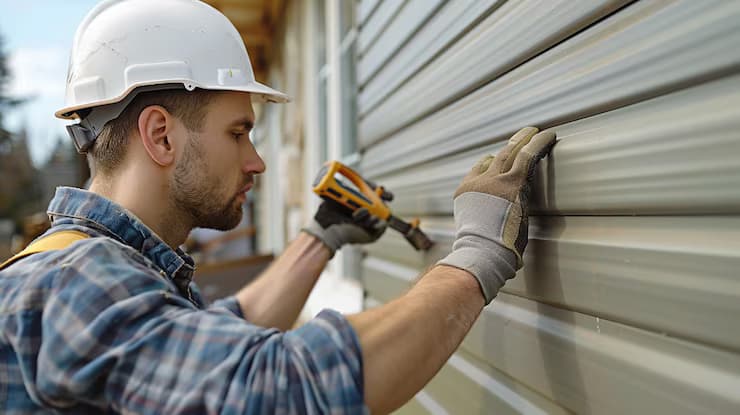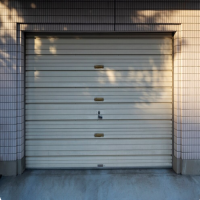How Long Does a Garage Door Replacement Take?

Strong 8k brings an ultra-HD IPTV experience to your living room and your pocket.
Replacing a garage door is an important investment in both the functionality and aesthetics of a home. Whether due to wear and tear, a malfunctioning opener, or simply an outdated look, many homeowners find themselves needing garage door replacement at some point. While it’s a significant task, the process can seem overwhelming for those unfamiliar with what’s involved. One of the most common questions people have is: how long does a garage door replacement take?
The time required to replace a garage door can vary greatly depending on a number of factors, including the type of door, the complexity of the installation, the experience of the installer, and any unforeseen issues that arise during the process.
In this article, we will explore these factors in detail and provide a general timeline for garage door replacement so homeowners can better understand what to expect.
1. Factors Affecting Garage Door Replacement Time
While there are general estimates, the time it takes to replace a garage door can differ depending on several factors. These factors can either speed up or slow down the process, so understanding them is key to setting expectations for the replacement.
a. Type of Garage Door
The type of garage door selected will play a major role in how long the replacement takes. There are several types of garage doors, including sectional doors, tilt-up doors, roll-up doors, and carriage house-style doors, each requiring different installation techniques.
Sectional Doors: These are the most common type of garage doors and are made of several panels that are hinged together. Sectional doors are easier to install than tilt-up doors, as they do not require large mechanical systems to operate. This typically results in a quicker installation process.
Tilt-Up Doors: These are large, one-piece doors that pivot upward when opened. Because they are more cumbersome and require a different installation approach, replacing a tilt-up door can take longer compared to sectional doors.
Roll-Up Doors: Roll-up garage doors are often used for commercial or industrial purposes but can also be used for residential homes. They require specialized parts and installation procedures, which can extend the time needed for the replacement process.
Carriage House Doors: Carriage house doors are typically more decorative and can involve a more intricate installation process. These doors may take longer to install due to their added complexity and aesthetic details.
The more complex or custom the door, the longer it will take to replace it.
b. Size and Material of the Door
The size of the door and the material from which it is made will also impact installation time. Larger doors or those made of heavier materials (such as steel or wood) require more effort to handle and install. A heavier material may also require additional safety precautions.
Steel Doors: These are sturdy and durable but can be heavy and difficult to maneuver. They may require additional equipment or more time for installation.
Wooden Doors: Wood doors are heavier and often come in custom sizes, which can extend the installation process. Additionally, wooden doors may require more adjustments during installation to ensure they fit correctly.
Aluminum and Glass Doors: These doors are lightweight and relatively easy to handle, but the delicate glass panels require careful handling to avoid breakage. Installing glass inserts or creating custom designs can take longer.
c. Customization
If the homeowner opts for a custom-built door, installation will likely take longer. Custom designs may require additional time for assembly, measurement adjustments, and fitting. A custom garage door may also have specialized features such as windows, decorative hardware, or specific color finishes, which can add extra time to the project.
d. Existing Door Condition
The condition of the existing garage door can affect the time it takes to complete the replacement. If the old door is still functioning relatively well, the installation process will likely go smoothly. However, if the old door is damaged or if there are complications with removing it (for example, if it is stuck or poorly aligned), the removal process could take longer.
Removal and Disposal: The time required to remove the old door depends on its condition and how it was originally installed. If the old door is bulky or has been poorly maintained, it may take additional time to safely dismantle and dispose of it.
Structural Issues: Sometimes, the frame or tracks of the old door may need to be repaired or replaced before installing the new door. This can add significant time to the project.
e. Installer’s Experience and Expertise
The experience and skill level of the installation team can have a significant impact on how long the process takes. Highly experienced professionals may be able to install a new garage door more quickly than a team with less experience, as they are familiar with common problems and have developed efficient workflows.
The tools and equipment available to the installer can also impact the speed of the installation. Professional installers come prepared with specialized tools to handle every step of the job efficiently, reducing the time required to complete the replacement.
f. Weather and External Factors
While it’s less common, weather conditions can sometimes affect the installation timeline. For example, if there is heavy rain, snow, or extreme temperatures, installers may face delays, particularly if parts of the door need to be installed outside. Similarly, if certain parts need to be ordered or customized, shipping delays could impact the overall project timeline.
2. Typical Timeline for Garage Door Replacement
Given the variety of factors that influence how long garage door replacement takes, it's important to have a general idea of what to expect. Most installations will follow a similar timeline, though complications can lead to slight variations.
a. Initial Consultation and Measurement (1-2 Hours)
The first step in the process is usually an initial consultation where the homeowner meets with the installer to discuss preferences, style, and material choices. The installer will take precise measurements of the garage opening and assess the existing structure to determine what is needed for the installation.
This process typically takes around one to two hours, depending on the complexity of the door and the homeowner’s decisions regarding customization.
b. Door Removal (1-2 Hours)
Once the measurements are taken and the new door is ready for installation, the next step is to remove the old door. This step typically takes one to two hours, depending on the condition of the old door and how it was originally installed.
If there are complications during removal, such as stuck or damaged parts, this may add some extra time to the process.
c. Installing the New Door (3-6 Hours)
Once the old door has been removed, the installation of the new door can begin. The new door’s panels are typically lifted into place, with the opener and tracks being carefully adjusted. If the opener is being replaced as well, this will add an additional hour or two to the process.
Sectional Doors: Installing a basic sectional door typically takes around 3 to 4 hours, depending on the door size and complexity.
Custom or Heavy Doors: Heavier or more complex doors, such as custom wood or large steel doors, may take 5 to 6 hours to install.
The process also includes adjusting the springs, ensuring the door operates smoothly, and checking the balance. Installers will also calibrate the opener, adjust the sensors, and check for any issues with the door’s function.
d. Final Inspection and Testing (1 Hour)
After installation is complete, the installer will perform a final inspection to ensure that everything is working correctly. This involves testing the door opener, ensuring smooth movement, and checking that the safety features are properly installed.
The installer will also show the homeowner how to use the new system and may offer tips on maintaining the door. This step usually takes about an hour.
e. Cleanup and Disposal (1 Hour)
Once the door has been installed and tested, the final step is cleanup and disposal of the old door. Installers will typically remove all debris, packaging, and the old door, leaving the garage neat and ready for use. This can take an additional hour.
3. Total Time for Garage Door Replacement
On average, the total time for garage door replacement can range from 4 to 8 hours, depending on the factors outlined above. The process generally involves the removal of the old door, installation of the new one, and final adjustments.
Basic Replacement: For a basic, standard sectional door with minimal customization, the job is usually completed in one full day (around 4-6 hours).
Complex Installations: For custom, heavy, or complicated installations, the project may take closer to 8 hours or even a full day and a half, particularly if the existing frame or structure needs adjustments.
Conclusion
In conclusion, the time it takes for garage door replacement varies based on the type of door, the materials used, the complexity of the installation, and the experience of the installer. On average, homeowners can expect the process to take between 4 and 8 hours, with most installations being completed in a single day.
Hiring professional installers ensures that the job is done safely, efficiently, and with the correct tools and knowledge. Homeowners should take time to choose a reputable installation team and communicate any preferences or concerns upfront to ensure a smooth process.
By understanding the typical timeline and what to expect, homeowners can be better prepared for their garage door replacement and ensure that their new garage door operates smoothly for years to come.
Note: IndiBlogHub features both user-submitted and editorial content. We do not verify third-party contributions. Read our Disclaimer and Privacy Policyfor details.


